

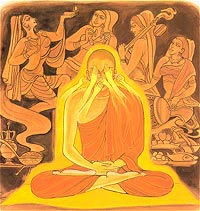 |
Verse 360. Sense Discipline
Explanation: It is good to be disciplined in the eye. It is good to be disciplined in the ear. It is good to be disciplined in the nose. To be disciplined in the tongue is good. |
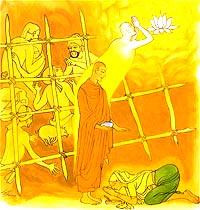 |
Verse 361. Suffering End With All-Round Discipline
Explanation: It is good to be disciplined in body. It is good to be disciplined in words. It is good to be disciplined in mind. The monk who is disciplined in all these areas will achieve freedom from all suffering. |
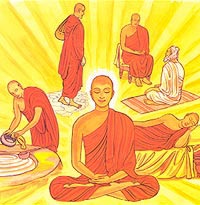 |
Verse 362. The True Monk
Explanation: He who controls his hands, controls his foot, controls his speech, and has complete control of himself; who finds delight in insight development practice and is calm; who stays alone and is contented they call him a monk. |
 |
Verse 363. The Ideal Monk
Explanation: The monk who controls his speech, who speaks wisely with his mind composed, who explains the meaning of the Dhamma - sweet are the words of that monk. |
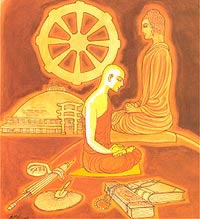 |
Verse 364. The Monk Abides in Dhamma
Explanation: The monk who abides in the Dhamma, who delights in the Dhamma, and is ever mindful of the Dhamma, does not fall away from the Dhamma of the virtuous. |
 |
Verse 365. Accept What One Receives
Explanation: Do not underestimate what you have received. And again, do not expect what others have got. If a monk covets what others have received, he will never attain tranquillity of mind. |
 |
Verse 366. The Gods Adore Virtuous Monks
Explanation: The monk may have received only a little but he does not under estimate what was given him. He is satisfied with what he has received. Such a monk, who leads a pure livelihood, is praised by deities. |
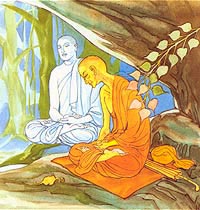 |
Verse 367. He Is A Monk Who Has No Attachment
Explanation: He has gone beyond all sense of his own name and form. To him, there is no existence of I, my or mine. If his name and form entity were to decay and deteriorate, he will not grieve. Such a person is called a monk. |
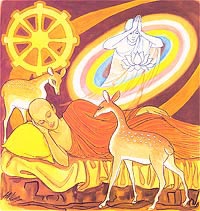 |
Verse 368. The Monk Who Radiates Loving-Kindness Radiates Peace
Explanation: The monk who extends loving-kindness to all, takes delight in the Teaching of the Buddha, will attain the state of bliss, the happiness of Nibbana, which denotes the pacifying of the agitation of existence. |
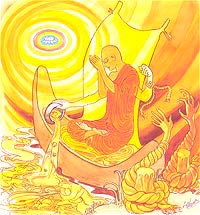 |
Verse 369. Give Up Lust And Hatred
Explanation: O monk, your boat must be emptied of the water which, if accumulated, will sink it. Once the water is taken out and the boat is emptied, both lust and hate gone, it will swiftly reach its destination - Nibbana. |
 |
Verse 370. Flood-Crosser Is One Who Has Giver Up The Fetters
Explanation: One should break away from the five lower fetter. One must get rid of the five higher fetters. One must cultivate the five faculties. One must go beyond five attachments. A monk who has achieved these is described as the one who has crossed the flood. |
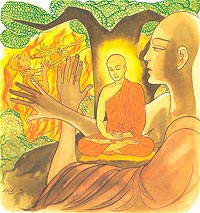 |
Verse 371. Meditate Earnestly
Explanation: O monk, meditate and do not be indolent. Do not allow your mind to loiter among sensual pleasures. If you allow it, it will be like having iron balls forced down your throat in hell. You will bewail your fate crying, "This is suffering," Do not allow it to happen. |
 |
Verse 372. There Is No Wisdom In Those Who Do Not Think
Explanation: For one who lacks meditation there is no wisdom. Both meditation and wisdom are essential and cannot be had without the other. If in a person, both wisdom and meditation are present, he is close to Nibbana. |
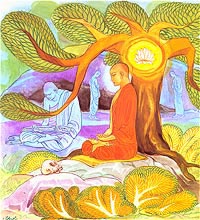 |
Verse 373. He Who Is Calm Experiences Transcendental Joy
Explanation: A monk who enters an empty house, whose mind is at peace, and who is capable of seeing the reality of things, experiences an ecstasy not known to ordinary minds. |
 |
Verse 374. He Is Happy Who Reflects On Rise And Fall
Explanation: When the meditator reflects upon the raise and the decay of the bodily aggregates he experiences a joy and ecstasy which is a fore taste of Nibbana for those who know it. |
 |
Verse 375. A Wise Monk Possess His Cardinal Virtues
Explanation: The joy experienced as a fore taste of Nibbana, through the awareness of the rise and decay of the aggregates, is the first step of the wise meditator. Guarding the senses, even-minded, and disciplined in the principal code of morality and association with good friends who are unrelaxed in their effort and are pure in behaviour. |
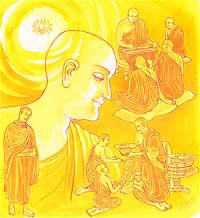 |
Verse 376. A Monk Should Be Cordial In All His Ways
Explanation: One should be courteous and of pleasant behaviour. One should be efficient in the conduct of the proper rites and rituals. Through these, one acquires a vast quantum of ecstasy, leading him to the ending of suffering. |
 |
Verse 377. Cast Off Lust And Hatred
Explanation: The jasmine creeper casts off its withered flowers. Exactly in that manner, O monks, cast off your passion and ill-will. |
 |
Verse 378. He Is Peaceful Who Is Free From All Worldly Things
Explanation: For a monk to be wholly and completely tranquil, he must be restrained in body and speech. This discipline derives from restraint of mind. Then, when these three forms of restraints have been achieved, the monk is automatically wholly and completely tranquil. |
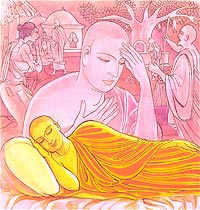 |
Verse 379. He Who Guards Himself Lives Happily
Explanation: One’s own self must prod one’s self. You must assess and examine yourself. O monk, this way, you must guard yourself. Be perpetually mindful. This way, live in bliss. |
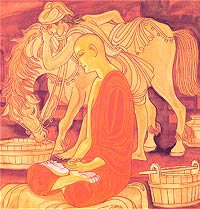 |
Verse 380. Your Are Your Own Saviour
Explanation: Your own self is your own refuge. You yourself are your own guide. Therefore, exert discipline over yourself as a merchant would cherish and retrain a noble horse. |
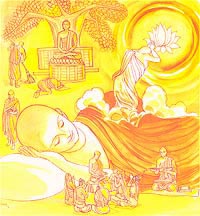 |
Verse 381. With Joy And Faith Try To Win Your Goal
Explanation: His ecstasy is abundant. He takes delight in the Teaching of the Buddha. Such a monk will reach the state of total tranquillity - Nibbana - through the blissful ending of conditioning. |
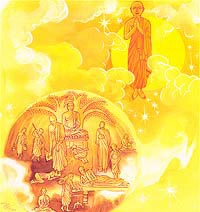 |
Verse 382. Even A Young Monk, If Devoted, Can Illuminate The Whole World
Explanation: This is true. If a young monk exerts himself strenuously in the Teaching of the Buddha, he will certainly illuminate the world as brilliantly as a moon emerging from behind a dark cloud that hid it for a while. |
| |
|
|
| |
|
|
| |
|
| |
|
|
|
|
|
|
|